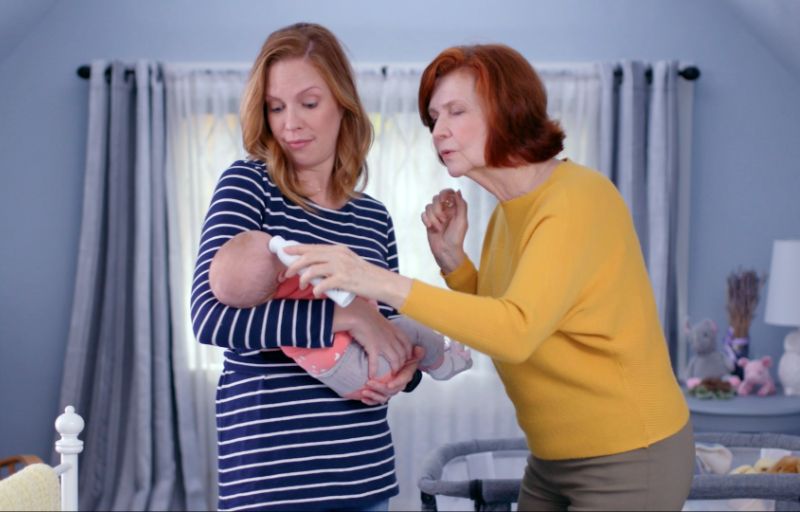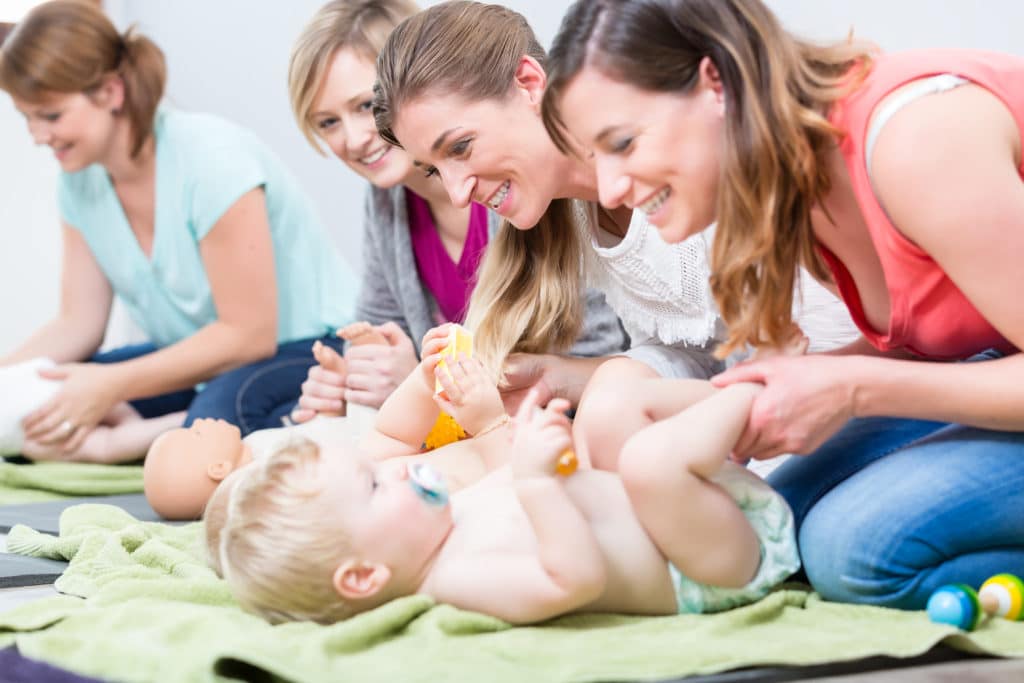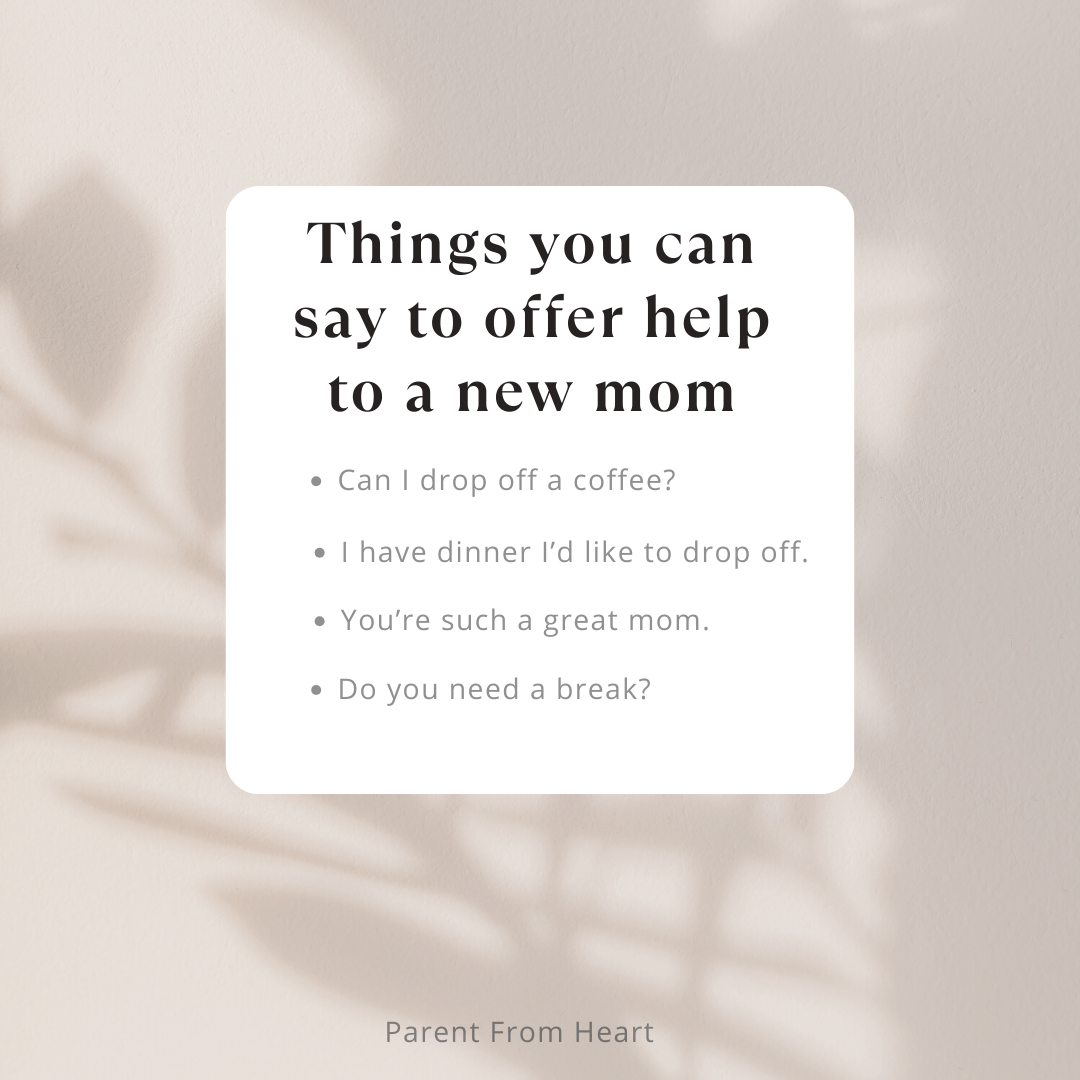New moms are inundated with unsolicited advice. Recently, I surveyed my friends and colleagues to find out what they felt was the best advice for new moms. Whether you’re looking for the best advice for new moms to be or are a new mom yourself, here you will find what advice to avoid, how to reframe common forms of unsolicited parenting advice, and the best advice for you too.
The first few days home from the hospital were glorious. Having been morning sick for 36 weeks of my 42-week pregnancy, the light at the end of the tunnel was a beautiful newborn, coffee tasting good again, and no longer needing to hug the cold porcelain of the toilet anymore.
Because my in-laws live overseas, my mother-in-law stayed with us for about a month.
During that time I basked in my new motherhood. I focused on my daughter, healing from my cesarean and soaking up the joy that came with having my little girl fall asleep on my chest.
When my mother-in-law left, things got real.
While I was still grateful for my newfound motherhood and relished in the precious moments, I was also rocked by how my entire world had changed so dramatically, and how nothing about my life was linear anymore.

Showering and adult conversations were interrupted by cries. Something as simple as plating store-bought rotisserie chicken and bagged salad took twice as long as it should. And unloading the dishwasher felt like my Everest.
When my head hit the pillow at night, I was still on duty.
On top of it, my body didn’t feel like mine anymore. Not only did I have a huge scar along my lower abdomen, but my breasts looked like torpedos. Every orifice of my body was leaking. My stomach was still puffy and felt like a mutant. There was no time for rest or self-care, and I was struggling.
Around eight weeks, my daughter went through a growth spurt and spent 48 hours latched to me. The moment my husband walked through the door and made eye contact with me, he knew. I was shaking, puke-soaked and desperate. I threw a can of formula at him and told him to keep the baby away from me for a while (the second she wanted to nurse again, I ended up grabbing her back).
It was around this sensitive time, that I came to learn another less-than-desirable part of being a new mom – getting inundated with advice.

“Don’t spoil the baby” was the one that got under my skin the most. As someone who studied psychology, I knew this was counterintuitive. But it bothered me nonetheless.
“Sleep while the baby is sleeping” made me feel like I wasn’t doing things right. For the first three months of my daughter’s life, she tended to nap in short spurts lasting less than 30 minutes at a time.
And then, there was the advice about sleep training. I had relative strangers visibly concerned that my four-month-old wasn’t sleeping through the night every night. And, it happened a lot. Whether I wanted it or not, I was inundated with advice for new moms on every topic you can imagine.
Related reading: Why Science Says You Can’t Spoil a Baby

There are nuggets of good advice amidst the unsolicited advice out there, they just need some editing. Here is the not-so-great advice for new moms and their better, edited counterparts.
I don’t know about you, but I’m not a light switch. I can’t just rest at the drop of a hat. And, I’m not sure if you noticed, but young babies sleep really unpredictably and for unusual durations. I have slept when my toddlers have slept, but if I did this every single time they did nap, nothing would get done around the house.
Better advice: Don’t try and do it all. If you need to rest, lie down and ignore your to-do list. If you’ll go crazy if you look at the unfolded laundry for one more minute then do that instead.
Pretty well every source imaginable says this is a bad idea because babies shouldn’t have solids until 4-6 months of age. Plus, it’s a choking hazard. The safest way to feed a baby ready for solids is while they’re sitting upright. Also, as Bettina, mom of two, points out, babies don’t just nurse for nourishment. They also do so for closeness and comfort.
Better advice: Nurse/ bottle feed your baby on demand. Follow your health authority or doctor’s advice for introducing solids. If you need a break delegate a night feed to your partner or a family member using pumped milk or formula.
Related reading: Introducing a Bottle to a Breastfed Baby – A Nervous Mom’s Guide
If you happen to hear this ill-informed piece of advice, you may want to ask that person to do a little Google search. There is no article based on developmental science that suggests it is possible to hold a baby too much. Before the advent of strollers, bouncy seats, and car seats, humans relied on holding and wearing babies in slings or makeshift carriers. Because of this, neonatal development is strengthened by physical contact. In fact, one study found that babies who were held less had less mature DNA (1). Quite simply babies rely on closeness and touch to develop optimally. As they get older, they will naturally want to be more independent. No amount of newborn-holding will stop this.
Better advice: Hold, carry and love your baby to help foster her development. When you need a break, put the baby down or pass her to someone else to regroup and recharge.

Every single piece of advice should be approached with an element of flexibility. Even if you feel it resonates with you, if your course of action changes, be forgiving of yourself. Also, don’t take advice just simply because it’s what you feel you should be doing.
It’s easy to get caught up in trying to be polite. However, if someone offers to bring over dinner, wash your floors, or fold your laundry, say yes. There is no prize for doing it all. Every extra little bit of help gives you extra energy, extra morale or just a needed break from being touched out.
Whether it’s going to the grocery store alone, driving to and from Starbucks or actually taking an hour or two to yourself, find a way to do it regularly. As cliche as it is to say, you can’t pour from an empty cup. And you’re not just doing this baby thing for the next few weeks. You have the next 18 years plus to be selfless most of the time. Take time for yourself.
We all have them. All of us. But they feel especially consequential when you’re a new mom. It’s easy to feel like each action defines your success in this new role. But this isn’t remotely true. Don’t let one bad moment destroy your self-esteem as a mother.
In fact, in a study on emotional development, Shore found that new mothers responded “the right way” to their babies approximately 30% of the time (2). What separated the best mothers from the average ones was their propensity to re-attune. Meaning, that when they failed to get their responses right the first time, these mothers tried again to find ways to get it right. As such, he concluded that the real power in parenting is in the “good enough mother.” It’s guaranteed that all parents will get parenting wrong often. However, what separates the best parents from the average is their desire to get back on track and re-attune themselves with their parenting goals and what is best for their infants.
Read: These Research-Backed Strategies Will Make You Happier
This is something I had to teach myself. But new moms need to listen to their instincts. If someone makes a suggestion to you that doesn’t sit well, let your gut be your guide. Vanessa, a mom of three, suggests saying, “Thanks, I’ve got this,” to shut it down.
I have friends who chose to formula feed because she could not take how draining and exhausting breastfeeding was and it was impacting her mental health. When my son was about five months old, I got so tired I stopped putting him in his crib and co-slept because I couldn’t get enough sleep any other way.
Every situation is unique and so are each person’s limitations.
The best piece of parenting wisdom I was ever given was from one of my regional managers. He said, no matter if it’s incredibly good or incredibly tiring, understand everything is fleeting. Relish in the good and hold onto it while you can. Motor through the hard times knowing there is an end in sight. No matter what, there will be a day when your baby no longer nurses, does sleep through the night, doesn’t fit into your arms, and needs you way less.
It’s been eight years since I brought my bright beautiful baby girl home. And in that time, I’ve learned to lower my expectations, roll with the punches more, and laugh at the fact that I’m now a bit of a hot mess mom. The unsolicited advice comes much less frequently too. I still fumble but I understand now more than ever that no one has this down pat.
As neuropsychologist Allan Schore shares:
Giving birth and becoming a mother to an infant is a profound experience. Not surprisingly, the early postpartum experience is an emotional and challenging time, associated with both positive and negative affect.
The truth is, it’s okay to falter, to feel out of touch with yourself and feel overwhelmed. Through the ups and downs, lean into those around you, share your experiences and soak up those baby snuggles.

These Research-Backed Strategies Will Make You a Happier Parent
“It Takes a Village:” 3 powerful reasons why mothers desperately need it
The Lonely Mom: how to conquer this feeling and engage the village again
3 Simple Ways to Promote Language Development in Infants
Why Sleep Training Might not Work and What to do Instead
(Book) The No-Cry Sleep Solution for Newborns
Any offer of help, notes of positivity, coffee, food delivery gift cards, essential oils, clothes that are breast-feeding friendly, precooked dinner dropped off, items to pamper herself at home like facial supplies, bath salts, and moisturizer. Read Here for some more ideas.
Find more of our favorite resources Here
Comforting miscarriage quotes can be a small but powerful way to help someone feel less alone. When facing…
Baby shower themes have come a long way from the days of pastel pinks and blues! These days,…
Weird signs that labor is near can sneak up on you when you least expect it. When I…